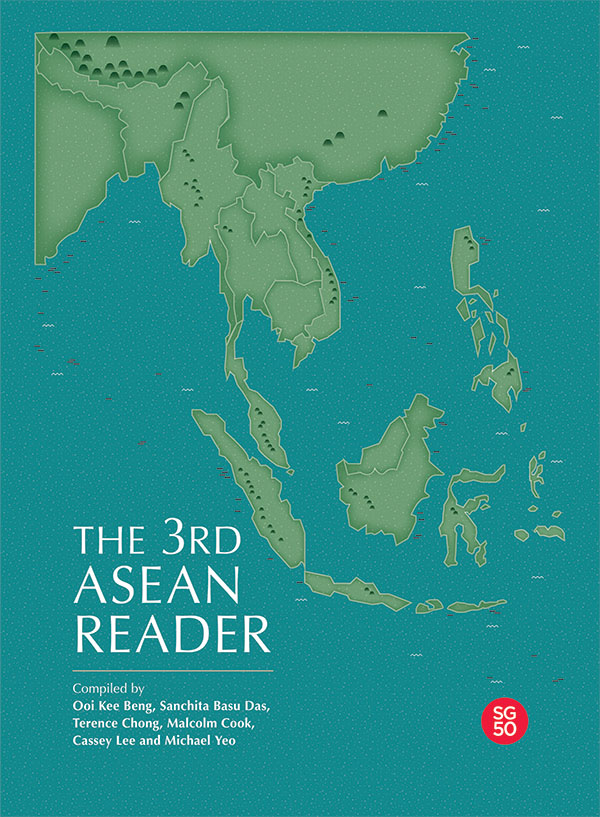Book contents
- Frontmatter
- Contents
- Preface
- Forewords to the First and Second ASEAN Reader: ASEAN: Conception and Evolution
- Forewords to the First and Second ASEAN Reader: ASEAN: The Way Ahead
- Forewords to the First and Second ASEAN Reader: New Challenges for ASEAN
- SECTION I ASEAN: THE LONG VIEW
- SECTION II COUNTRY ANALYSES
- SECTION III COMPARATIVE ANALYSES OF THE REGION
- Southeast Asian Societies
- The Southeast Asian Economy
- Southeast Asian Politics
- SECTION IV INTERNATIONAL DEVELOPMENTS
- SECTION V INSTITUTIONS OF ASEAN
- SECTION VI ASSESSING ASEAN'S INTERNAL POLICIES
- ASEAN Political Security Community
- ASEAN Economic Community
- 41 Implementing the ASEAN Economic Community Blueprint
- 42 Towards an ASEAN Economic Community by 2015
- 43 Understanding ASEAN's Connectivity
- 44 Enhancing the Institutional Framework for AEC Implementation
- 45 What is a Single Market? An Application to the Case of ASEAN
- 46 Non-Tariff Barriers: A Challenge to Achieving the ASEAN Economic Community
- 47 Towards a Truly Seamless Single Windows and Trade Facilitation Regime in ASEAN Beyond 2015
- 48 An Assessment of Services Sector Liberalization in ASEAN
- 49 Financial Integration Challenges in ASEAN beyond 2015
- 50 Free Flow of Skilled Labour in ASEAN
- 51 Toward a Single Aviation Market in ASEAN: Regulatory Reform and Industry Challenges
- ASEAN Socio-Cultural Community
- SECTION VII ASSESSING ASEAN'S EXTERNAL INITIATIVES
- ASEAN Processes
- ASEAN's Major Power Relations
- SECTION VIII SOUTHEAST ASIA: PERIPHERAL NO MORE
- Bibliography
- The Contributors
- The Compilers
51 - Toward a Single Aviation Market in ASEAN: Regulatory Reform and Industry Challenges
from ASEAN Economic Community
Published online by Cambridge University Press: 22 June 2017
- Frontmatter
- Contents
- Preface
- Forewords to the First and Second ASEAN Reader: ASEAN: Conception and Evolution
- Forewords to the First and Second ASEAN Reader: ASEAN: The Way Ahead
- Forewords to the First and Second ASEAN Reader: New Challenges for ASEAN
- SECTION I ASEAN: THE LONG VIEW
- SECTION II COUNTRY ANALYSES
- SECTION III COMPARATIVE ANALYSES OF THE REGION
- Southeast Asian Societies
- The Southeast Asian Economy
- Southeast Asian Politics
- SECTION IV INTERNATIONAL DEVELOPMENTS
- SECTION V INSTITUTIONS OF ASEAN
- SECTION VI ASSESSING ASEAN'S INTERNAL POLICIES
- ASEAN Political Security Community
- ASEAN Economic Community
- 41 Implementing the ASEAN Economic Community Blueprint
- 42 Towards an ASEAN Economic Community by 2015
- 43 Understanding ASEAN's Connectivity
- 44 Enhancing the Institutional Framework for AEC Implementation
- 45 What is a Single Market? An Application to the Case of ASEAN
- 46 Non-Tariff Barriers: A Challenge to Achieving the ASEAN Economic Community
- 47 Towards a Truly Seamless Single Windows and Trade Facilitation Regime in ASEAN Beyond 2015
- 48 An Assessment of Services Sector Liberalization in ASEAN
- 49 Financial Integration Challenges in ASEAN beyond 2015
- 50 Free Flow of Skilled Labour in ASEAN
- 51 Toward a Single Aviation Market in ASEAN: Regulatory Reform and Industry Challenges
- ASEAN Socio-Cultural Community
- SECTION VII ASSESSING ASEAN'S EXTERNAL INITIATIVES
- ASEAN Processes
- ASEAN's Major Power Relations
- SECTION VIII SOUTHEAST ASIA: PERIPHERAL NO MORE
- Bibliography
- The Contributors
- The Compilers
Summary
OVERVIEW
The ten member states of the Association of Southeast Asian Nations (ASEAN) have identified a 2015 deadline to establish an ASEAN Single Aviation Market (ASAM) for the liberalization of air transport services in the region. Also referred to as the “ASEAN Open Skies” policy, the aim is to have the ASAM in place by the time the proposed ASEAN Economic Community (AEC) takes effect in 2015.
Over the years, the concept of progressive liberalization of air transport services has been reaffirmed at successive high-level fora, particularly at the annual ASEAN Transport Ministers’ Meetings (ATMs). In November 2004, building upon earlier discussions, the 10th ATM in Phnom Penh, Cambodia, adopted an Action Plan for ASEAN Air Transport Integration and Liberalization 2005–2015 (ASEAN, 2004). This Action Plan, together with an accompanying document known as the Roadmap for Integration of Air Travel Sector (RIATS), laid down the now-familiar target date of 2015 for achieving an effective “open skies” regime for the region.
At this juncture, it is critical to appreciate what exactly the various “freedoms” entail. To take an example, a Singapore carrier flying between Singapore and Bangkok, Thailand would require the “first freedom” to overfly Malaysian airspace and the “second freedom” to stop in Malaysia for fuel and supplies, if necessary.
The actual commercial opportunities are covered by the subsequent “freedoms”. All these “freedoms” or rights are granted by states to each other through bilateral negotiations, often with flight and capacity limits.
MAAS, MAFLPAS AND MARKET ACCESS LIBERALIZATION
At the 13th ATM held in Singapore in November 2007, the Transport Ministers reaffirmed their commitment toward the RIATS goals and agreed to expand RIATS to implement the ASEAN open skies policy by 2015 as part of the formal ASEAN Single Aviation Market (ASAM).
Since then, the RIATS commitments for passenger services have been successfully incorporated into two formal legal agreements for ASEAN member states’ acceptance. These are the Multilateral Agreement on Air Services (MAAS) and the Multilateral Agreement for Full Liberalization of Passenger Air Services (MAFLPAS), adopted in 2009 and 2010 respectively.
The idea of relaxing market access rights within and between sub-regions demon-strates ASEAN's incrementalist philosophy of starting with modest goals first and pursuing more ambitious relaxations at a later stage.
- Type
- Chapter
- Information
- The 3rd ASEAN Reader , pp. 266 - 270Publisher: ISEAS–Yusof Ishak InstitutePrint publication year: 2015

